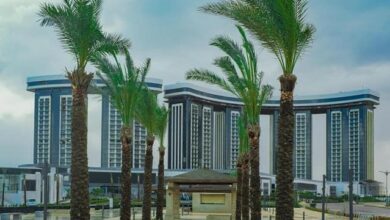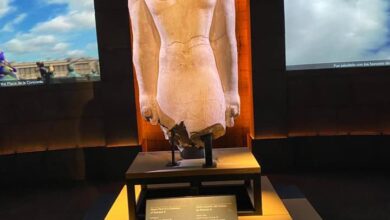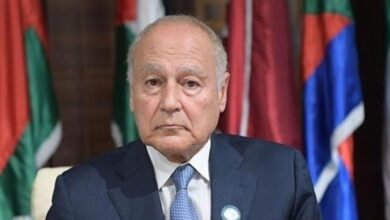Tarek Abd al-Kader is the acting minister and head of the Media and Communications Sector at the Arab League. With over three decades at the institution, he has a unique perspective on its internal happenings and its effectiveness in the region. He sat down for an interview with Al-Masry Al-Youm recently to talk about the role of the Arab League in this period of tumult and change, and how that role might develop.
Abd al-Kader spoke with Al-Masry Al-Youm not as a representative of the Arab League, but as an “Arab intellectual interested in public affairs.” The opinions he shared are entirely his own.
Al-Masry Al-Youm: How do you see the role of the Arab League in light of recent developments in the region?
Tarek Abd al-Kader: The current reality indicates that what’s happening now is a comprehensive strategic change in the region. There were many warning signs and the Arab League should have felt the pulse of the Arab street over the past decade. The role of those official totalitarian governments [within the league] should have diminished, with a greater inclusion of civil society.
The Arab League did not manage to translate this into pragmatic terms with tangible changes on the ground. It dealt with this other part in a bureaucratic governmental manner, rather in the direct manner that was needed.
The Arab League needs to develop itself to keep up with this change in the region and needs to meet the needs of the Arab street, and that can be done with greater cooperation with civil society and not just governmental organizations. It cannot be overtaken by events if it is to justify its existence.
Al-Masry: Amr Moussa, the secretary general since 2001, recently resigned to pursue a bid for the presidency. He was replaced by Nabil al-Araby, Egypt’s first interim foreign minister. Has the change in secretary general contributed to the league's inability to keep up with events?
Kader: It wasn’t the only reason. What happened was that different approaches were adopted towards different countries. For example, the league’s stance on Libya was not the same as its stance on Syria. This difference threatened the credibility of the Arab League in the Arab street. There has to be one standard that applies to all, and if there are extraneous circumstances that dictate a different approach, then they must be clearly explained to the Arab people that look to the league as its representative and last regional resort, and not to the official governments or Arab foreign ministers.
Al-Masry: We now have some Arab countries that are undergoing great change, and others – like Saudi Arabia – that appear to be uncomfortable with this change. Will this schism affect the workings of the league?
Kader: Egypt in recent times lost a lot of things: its soft power, its instruments of policy, and everything that made it a big player in the region. As a result, other countries emerged, playing a major regional role. Qatar is also an example of this. Saudi Arabia has a major role in a pivotal region, such that when conflict occurs within it, its repercussions are felt the world over. There is much interest in Saudi Arabia as a major oil-producer from other regional and international powers, which makes it more sensitive in its response to the unrest around it. Saudi Arabia is an important country in the region and its role will not diminish within the league.
Al-Masry: That leads us to Iran then, as one of those powers. Couldn’t the Arab League play a bigger role in improving relations between Iran and the Arab world?
Kader: There were initiatives from Amr Moussa in that regard within the framework of neighboring non-Arab countries to remove the minefields and misunderstandings between many of the countries. The Arab world will not prosper without solving the many flashpoints of tension between it and those countries, which delay progress and development.
Al-Masry: Regarding the Palestinian issue, there’s a school of thought that the changes of regime across the region could lead to more pressure on Israel to be more amenable to a solution. Do you agree with that?
Kader: It should start and end with Palestinian reconciliation. In the past few years we can’t say that movements or groups with such a vital cause should be so geographically divided within the Palestinian territories, with Hamas controlling Gaza and the Palestinian Authority in the West Bank. And they ask the Arab world for support. Who should the Arabs support then, Hamas or the Palestinian Authority? This is a very debilitating situation for the cause.
Al-Masry: Nabil al-Araby is to be the next head of the Arab League. Some in Egypt wanted him to remain as foreign minister because he managed to accomplish some things, such as a Palestinian reconciliation agreement and ordering the opening of the Rafah crossing in a short period of time. Do you think his move to the league can achieve similar results?
Kader: Nabil al-Araby will be very useful in his new post and will play the role that is expected of him. There is a point that must be considered. The admiration that Araby has in Egypt and the Arab world was because of stances that were related to Arab issues. There was his position regarding the Rafah border crossing, the Palestinian issue and with Iran.
If he managed to earn admiration from that then he will certainly play a bigger and more effective role as secretary general of the Arab League. There are other examples during his short tenure as foreign minister, such as his dealings with Sudan and the Nile Basin countries, which are also regional issues. These are all things that recommend him to the post of secretary general.




